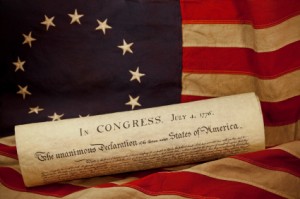 During the spring of 1776, a number of important steps took place in the colonies that would lead toward independence from Great Britain. Chief among them was a resolution adopted on May 15th by the Virginia Convention in Williamsburg. That resolution instructed Virginia delegates in Congress to propose that body to declare the United Colonies “free and independent States, absolved from all allegiance to, or dependence on, the Crown or Parliament of Great Britain.”
During the spring of 1776, a number of important steps took place in the colonies that would lead toward independence from Great Britain. Chief among them was a resolution adopted on May 15th by the Virginia Convention in Williamsburg. That resolution instructed Virginia delegates in Congress to propose that body to declare the United Colonies “free and independent States, absolved from all allegiance to, or dependence on, the Crown or Parliament of Great Britain.”
The die for independence was cast as the Virginia delegation pressed for “assent of this Colony to such declaration, and to whatever measures may be thought necessary by the Congress for forming foreign alliances, and a Confederation of the Colonies, at such time and in the manner as to them shall seem best: Provided, that the power of forming government for, and the regulation of the internal concerns of each Colony, be left to the respective Colonial legislatures.”
Thomas Paine’s Common Sense had already gained wide circulation, leading to vigorous debate about the issue of personal freedom. Even so, delegates to the Continental Congress in Philadelphia were divided on the issues of independence and the establishment of confederated colonies. But on May 27, when Congress heard the Virginian delegates, the movement toward independence took a new life.
Richard Henry Lee of Virginia presented a motion to Congress on June 7that read:
“Resolved, that these United Colonies are, and of right ought to be, free and independent States, that they are absolved from all allegiance to the British Crown, and that all political connection between them and the State of Great Britain is, and ought to be, totally dissolved.”
56 Men Pledged Their Lives, Their Fortunes, and Their Sacred Honor So That We Could Be Free…
Though John Adams seconded the motion, moderates moved to postpone a vote on the resolution for three weeks. When it became obvious the motion would ultimately pass, a Committee of Five was chosen to prepare a formal declaration. As a result, on June 11 Thomas Jefferson, John Adams, Benjamin Franklin, Robert R. Livingston, and Roger Sherman were entrusted with this important duty.
Though only thirty-three years old, Jefferson had significant experience in political service and writing. In 1774, while a member of the Virginia House of Burgesses, he had written A Summary View of the Rights of British America. In the spring of 1776, Jefferson also composed a draft of a proposed constitution for Virginia.
In preparation for his draft of the Declaration of Independence, Thomas Jefferson relied heavily on his draft of the proposed constitution for Virginia; George Mason’s Declaration of Rights, adopted by Virginia on June 12, 1776; and Richard Henry Lee’s resolution proposed to Congress on June 7th.
Upon completion of his draft, Adams and Franklin offered minor changes. After that, Jefferson prepared a “fair copy,” or revised document, to be presented to Congress. The rough draft contains corrections, additions, and deletions, primarily in Jefferson’s hand, made by Adams and Franklin, the Committee of Five, and later by Congress.
The Committee of Five, on June 28, presented to Congress the document entitled “A Declaration by the Representatives of the United States Of America in General Congress assembled.”
Jefferson sat and listened for three days while Congress altered his document. The most significant alteration was the elimination of a paragraph that restricted slave trade and a few statements denouncing the people of England for their contribution to the war against the colonies. Because the colonists were chiefly dissatisfied with the King and his government, Congress chose to eliminate the passage that included British brethren.
On July 4, the Congress ratified the Declaration, and it was formally adopted by unanimous vote of all the colonies represented. The Congress voted immediately to authenticate and print the document. The president of Congress, John Hancock, signed the document, thereby authenticating it. Secretary Charles Thomson attested to it with his signature.
On August 2, 1776, the members of the Continental Congress assembled and it was recorded in the Journal that “the declaration of independence being engrossed and compared at the table was signed [by the members].” The general public did not know the names of those individuals who signed the Declaration until months later.
Many today, unfortunately, have never read this seminal document, nor do they understand the risk our founding fathers took in writing and signing their names to it.
©2012 Off the Grid News
 Off The Grid News Better Ideas For Off The Grid Living
Off The Grid News Better Ideas For Off The Grid Living

